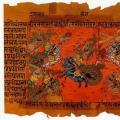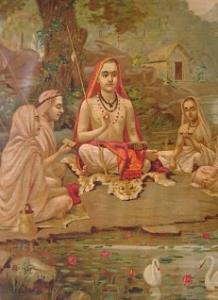24. No Two Ways About It: Śaṅkara and Advaita Vedānta
Śaṅkara and his “non-dual” (Advaita) Vedānta, which teaches that only brahman is real, and the world of experience and individual self are mere illusion.
Themes:
• V.H. Date (trans.), Vedānta Explained: Śaṁkara’s Commentary on the Brahma-Sūtras (Bombay: 1954).
• E. Deutsch and J.A.B. van Buitenen, A Source Book of Advaita Vedānta (Honolulu: 1971).
• B. Carr, “Śaṅkara on Memory and the Continuity of the Self,” Religious Studies 36 (2000), 419-34.
• W. Fasching, “On the Advaitic Identification of Self and Consciousness,”in I. Kuznetsova, J. Ganeri, and C. Ram-Prasad (eds), Hindu and Buddhist Ideas in Dialogue: Self and No-Self (Aldershot: 2012), 165–80.
• N. Isayeva, Shankara and Indian Philosophy (Albany: 1993).
• K.H. Potter (ed.), Encyclopedia of Indian Philosophies, vol. III: Advaita Vedānta up to Śaṁkara and his Pupils (Delhi: 1981).
• A. Rambachan, The Advaita Worldview: God, World and Humanity (Albany: 2006).
• J.G. Suthren Hirst, Śaṁkara’s Advaita Vedānta: a Way of Teaching (London: 2005).
• S. Timalsina, Consciousness in Indian Philosophy: the Advaita Doctrine of “Awareness Only” (London: 2009).
• F. Whaling, “Śaṅkara and Buddhism,” Journal of Indian Philosophy 7 (1979), 1-42.







Comments
Illusions
In this episode you illustrated the Madhyamaka (I think?) Buddhist notion that sensation is illusion, and Sankara's critique of it. You didn't mention it in the podcast, but aren't the two very different? the Buddhist illusion is on the basis that the seer is nothing but a momentary collection of skandas and thus an illusion, and the thing seen is nothing but a momentary collection of skandas and thus an illusion... but it would then be necessary still that the seer and the seen are different from one another.
But Sankara's position says almost the opposite. The seer absolutely exists, and the seen absolutely exists, but the seer and seen are one and the same, and the act of sight is nothing but the self illuminating sight from the deep sleep analogy.
Isn't it only on the basis that the resulting sight is illusion that the two sides agree, then?
In reply to Illusions by Alexander Johnson
Illusions
Yes exactly: they both reject "common sense" ideas of reality where there are (real) distinct persons and objects in the world, but the underlying metaphysics is opposite. It's not just whether there is a contrast between seer and seen, but also about identity over time: for the Buddhists everything is momentary, for Sankara everything is eternal (but everything is one thing, brahman). So that's why, as we explain in the episode, he has this long attack on Buddhist skanda theory.
disappointment
I have been studying Advaita for a couple of months, i don't know a lot, but this episode seems to misrepresent it. You say Brahman is a special kind of consciousness, no, it IS consciousness. That is the whole point, it is always available to use, nothing special about it, there is nothing else but this, we are confused to see the world as many separate things, and are not aware of the underlying reality, unity, oneness of all. Brahman is the is-ness of the world, all is appearance in Brahman. It is not evident to itself, it becomes evident to itself in liberation, when the individual sentient being realizes itself as Brahman.
I comment because I enjoyed a lot of your episodes, and you can do better!
by the way, very interesting to read Parmenides in the light of Advaita. And some claim Hegel plagiarized the Upanishads... check it out again, it's very intriguing.. but also it is not exactly just philosophy, but more spiritualism maybe.. read Drig drysia viveka to clear up your strange use of the deep sleeper example...
In reply to disappointment by Philipp Hesser
Brahman
Glad you like the series in general! I don't quite get your criticism, because what you say sounds right to me and sounds like just what we explained, no? This is exactly the difference between Vedanta or Upanisadic theories of the self in general, and Advaita Vedanta in particular: that in the latter, there is nothing other than Brahman i.e. consciousness. I mean, we say in the very first paragraph of the episode: "For [Sankara] the world is an illusion, which masks the single underlying reality of brahman. To accept the reality of the everyday world is ignorance (avidyā), while to know the sole reality of brahman, and the identity of the self (ātman) with brahman, is to achieve liberation." Isn't that just the same point you are making? But please let me know if I am missing something.
In reply to Brahman by Peter Adamson
"Consciousness is evident of…
"Consciousness is evident of itself even if there is nothing of which it is conscious". I don't know, am i not getting it/misunderstanding the sentence or is this statement non-sense? if it is evident of itself (knows itself) how can it at the same time not be evident of itself? and if satchitananda (another name for the same thing, existence, consciousness, bliss) is one, wouldn't knowing itself be a second? in my understanding Brahman is not self conscious, but simply is. is-ness, being-ness. According to Sankara knowledge is the way to liberation, also worship (not mentioned, he wrote many hymns, still sung to this day), which is not at all the same as ritual (you don't say that, but maybe think that by leaving it out? no mention of any gods either), and there are preliminaries, discrimination what is real and false, dispassion for the world, desire to be free. the technique of neti neti (not this not this). no mention of maya (the veil of ignorance, that through which this universe appears), so much you missed out (many gaps ;-) instead you insisted on shruti and made Sankara look like a douche. no, i accuse you of misrepresentation.. if all is Brahman, how to arrive at the idea it is nihilism? that Brahman is nothing? how is formlessness nothing at all? are thoughts nothing then? shunyam, the void, what buddhists insist on. hindus speak of ananta, infinity (although you could argue it amounts to the same, underlying reality).. the most important affiliation/identification to be given up, that with the body-mind, is not mentioned (that is the key insight).. Am i a fanboy or what? half baked criticism here with my, as they say in german, "gefährliches Halbwissen" (dangerous half knowledge) haha (i realized now i was too lazy to look for your email Mr. P.A., it just wanted to give feedback to you, not necessarily the public. maybe cut out this last sentence, and also my comment from before. i see how 20 minutes is a bit short to satisfyingly portray Sankara and Advaita. maybe i would just wish for more episodes, a bit better researched and understood..(like the episodes about the islamic world) spoken with your calm voice, those not so funny funny jokes. well, life is suffering and now i have to live with the consequences of having posted this..). sorry, i mean no disrespect, i appreciate your work. it's just that my bs-sensor kicked in (which is usually accurate) and i felt the urge to comment.. keep up the work! all in all you are doing knowledge-hungry people a great service.
In reply to "Consciousness is evident of… by Philipp Hesser
Advaita
Gosh, lots going on in that comment. There is a narrow issue here and a broader issue: the broader issue is, how many of these ideas are to be ascribed to Shankara? I think that you are conflating his teaching with a lot of other elements of the Indian tradition, most of which we actually do discuss elsewhere in the series (e.g. some of what you say is covered in the episode on Tantra). But it would be a long discussion which of these ideas can be reasonably ascribed to Shankara and which not, e.g. whether he is committed to something like a Buddhist nothingness theory. The narrower question is how to understand his equation of Brahman and consciousness. I personally am not very attracted by your claim that this is just the same as being or "is-ness" because that seems to lose track of the idea that Brahman is indeed conscious, like, is has subjectivity. Consciousness is intentional, or has "directedness," which is not true of the concept of "being". That sentence you quote is one that I think needs to make sense if his teaching is to succeed, since there is nothing other than Brahman so there is nothing for it to be conscious of, or at least, nothing else besides Brahman. (Maybe we should indeed have added the word "else" there.)
Add new comment